- Home
- Andrew McGahan
The Ocean of the Dead: Ship Kings 4 Page 32
The Ocean of the Dead: Ship Kings 4 Read online
Page 32
And he took no pleasure in it.
Not with Nell left far behind.
But in both his certainty, and his bitterness, Dow was alone. For everyone else on board, the following days were an agony of hope and doubt as the Chloe surged along behind the thrusting attack boats. By the knotted rope, they were now making forty and even forty-five miles in a day. Swift – but was it swift enough? The Sterile Sea seemed endless.
But then it did end.
On their fourth morning under powered tow, a brownish tinge loomed on the horizon, a green smell lifted in the air, and by midday they were sailing among the familiar weeds and slimes of the everyday world, growing thicker every hour as they pressed south.
This brought new dangers, as Dow knew well. If the southern Doldrums were the same as the northern – and it seemed on first inspection that they were – then the Chloe was back in the realm of the Miasma, and of the deadly algal blooms that could poison the air or eat away a hull. But his bleak confidence was unbroken: if they were to live at all, they must pass swiftly to open waters – therefore fate would clear the way for them to do so.
For another week they held south through the heat and stillness of the outer zone, the boats making better speed every day. No wind blew yet, but there could be no mistaking their progress, for overhead the Doldrums roof was finally thinning and breaking apart. The sun shone more nakedly by day, by night the moon reappeared, and upon the sea the haze withdrew to reveal the dim line of the horizon. At last there came an evening when even as the sun sank, the lookouts began to call, pointing to the firmament – and there in the sky, tiny points of light gleamed, faint and far away.
The stars.
Dow, along with all those on deck, stared up as if famished for the sight. They were beautiful beyond bearing. And they confirmed the truth of the Chloe’s great journey from one world to another, for almost directly above soared a familiar constellation: the Dagger, presiding now over its natural home, the southern hemisphere. And south of the Dagger, unseen before by human eyes, spread an entire field of stars unknown and unnamed, the constellations of an ocean upon which no ship had ever sailed.
Now, only one thing was lacking – and it came a mere two days later. Close to noon, the lookouts cried another warning, and far off to the west, a ruffle and sheen could be seen upon the ocean. It moved towards them in fits and leaps, and with fumbling out-of-practice hands, the crew hurried to raise the sails and to attend to the last repairs of the rigging. Dow called in the boats, and for a breathless interval the Chloe slowed and drifted as the ruffle on the water grew nearer.
Then it happened. With a flap that was a groan of memory, the canvas aloft stirred. On the faces of those crowded on the deck, a breeze was felt, warm and light, but real, and a delight unimaginable to skin that had known no wind since the other side of the world.
The sea – for so long a dreary, somnolent green – suddenly rippled, sparkling blue and silver in the shifting airs. The sails filled and stiffened and pulled. The ship dipped a moment, paused, then slid forward – and men and women fell weeping to the deck.
So it was that the Chloe – and the nine hundred souls still living on board – won free of the Doldrums, and came at last to the southern world.
But Dow only withdrew to his cabin. For unlike all his crew and companions, he did not behold the blue sky, or the shimmering sea, or the white wake frothing at the ship’s bow. His gaze looked inward, and saw only one thing: Nell, trapped far behind in the eternal, drear heat of the Barrier, not dead, not dead, and yet never to know any such joys as these again.
15. THE GREAT SOUTHERN LAND
Fidel, had he lived, would have been much gratified. It was he who had reasoned that the expedition should sail directly south from the Kingdoms, following the great undersea ridge that he hoped would rise into a landmass in the New World. True, in the Barrier, that ridge had disappeared into an abyss. But Dow ordered soundings taken soon after the wind came – and found that the ocean floor was rising again.
He held his course thus, and south they sailed on a wind that blew day after day. It was a charmed wind, indeed, for they were not yet in fact clear of the outer Doldrums and the threat of becalming, but even so it never faltered, only grew stronger and steadier, until finally it was driving the Chloe along at a madcap hundred miles a day and more, spray dashing from the bow. After the tortured labour of the inner Barrier, it felt like flying.
By the fifth such day, the navigators reckoned them free even of the outermost Doldrums, and back upon the ocean proper. In confirmation, the wind had by then settled into a deep and unending thrum, with all the assuredness of a Band wind, the weather of the open world. There was a new humidity to the air, and there even came, astounding, an afternoon of heavy rain, a downpour that seemed to wash both the ship and its crew clean of all the Barrier slimes and sweat and hopelessness, not to mention refilling the water barrels.
Thus refreshed, the Chloe leapt on at the fantastic rate of one hundred and fifty miles in a single day and night. It was glorious. And yet their storerooms were all but empty, the crew surviving now on the barest scraps.
For six more days they raced south with full sails, watchers scanning the horizon in a final exquisite agony; this new hemisphere felt so alive, so full of promise, could it truly fail them here at the very last? Then, on the twelfth dawn since the rising of the wind, with barely two days’ worth of rinds and crusts left to eat, the cry came from the lookouts at first light.
‘Land! Land to the south!’
It brought another flood of people to the main deck, weeping in their relief, though Dow had never doubted, since finding the oil, that the sight would come.
‘Land! And lo – a great coast it is!’
It was a great coast indeed, having marched up in the night to stand now upon the horizon, a shore that stretched away east and west beyond vision. At its forefront were green lowlands, but behind rose tall hills clad in grey, their heads thrust high into cool airs; and to be glimpsed through passes in the hills, far off but rearing vastly and snow-clad despite a latitude so close to the tropics, a great wall of mountains tilted at the sky.
Even at his first glimpse of this white barrier, Dow knew that another mystery was solved. For there, on the unscaleable heights of a range sheerer and loftier than any in the northern world, must surely be where the Ice Albatross made its home, in those times when it left the sea to roost. Thus a further piece of fate’s master puzzle clicked into place.
And still Dow took no pleasure in any of it.
Up strode the shore, closer and closer. At first, amid windswept beaches and stony bluffs, there seemed to be no place fit for a landing. But blithe yet, Dow turned the Chloe eastward, and after a day of skimming along the new coast, dusk found them approaching a great bay that spread its arms in welcome. Through the telescope, a sheltered haven could be seen at its heart, where a small river met the sea at the foot of a low headland – as prime a harbour as to be hoped. Wary now only of testing the shallows by dark, Dow hove to some three miles offshore, to wait for the dawn.
A finer sunset few on board had ever known. The wind blew warm, and the ocean was an endless procession of white-touched waves, still a wonder to behold after the long months of stagnant seas. Forests rose upon the shore, wafting scents of earth and growth, and yet so clear was the air that on the sharp southern edge of the world the remote snow-tipped peaks stood vivid and afire in the dying light, even as the sky awoke with stars.
And as Dow and the others on the high deck stood in silence to take in the last of the day, Jake Tooth, his long convalescence complete, made his first appearance topside since receiving his injuries.The harpooner was still bony and weak, leaning heavily on the shoulder of a nurse, and the sleeve of his shirt flapped empty beneath the stump of his arm. But the old grin was back upon his gaunt face.
‘Well, New Islander,’ he said to Dow, ‘against all the odds, you have sailed off the very edge of the world, and yet t
riumphed in the end.’
Dow only nodded in return. As much as it warmed his heart to see his old companion upright once more, the inner chill remained.
Jake studied him a moment longer, the grin fading. ‘Aye, but my Agatha lies in the deeps far behind, and others beside. And as for your Nell . . .’ He did not finish, only turned to consider the coastline in the evening glow. ‘It’s a fine-looking shore though, no mistake. Tomorrow will make for a noble landing.’
‘It will,’ said Boiler, who had been standing with Dow. ‘As long as we meet with no resistance, for we have no strength left to overcome any. But can we really be sure that no one lives here already?’
‘No one lives here,’ said Dow.
And Jake added, ‘Do you see any lights burning as night falls? Any hint of habitation? Nay, Fidel had it right. This shore is untrodden and unclaimed.’
‘This shore, maybe,’ argued Boiler. ‘But what of the entire isle? How can you know that no folk dwell anywhere upon it?’
The harpooner laughed. ‘Yonder harbour is everything a mariner could wish for. If there is no port or town there, then there is no port or town anywhere at all upon this island, rest assured of that.’
Boiler thought for a time, then nodded. ‘But if this land is truly empty, then it has no name.’
‘You know, you’re right,’ said Jake. ‘A name is something we’ll have to give it. What do you say, Dow? The choice is yours, if anyone’s.’
Dow blinked a moment. He honestly had given it no thought. Yes, the land would need a name. It was the New World, but he did not think it should be called anything so grand as that, not for day-to-day use.
What had the mariners of old done, in the Age of Exploration? Why, upon sighting their first shore away from their home of Great Island, they had called it, sensibly enough, New Island. And they had named the other two Isles in similar and simple fashion, Red Island for the colour of its iron-rich hills, and Whale Island for the many whales that swam in the waters about.
Well, then, Dow would do likewise – and lifting his gaze to the far-off peaks, pale shadows now in the evening, he knew what it would be. ‘Call it White Island,’ he said. ‘The Land of the Albatross.’
And so history has known it ever since.
*
‘One other thing,’ Dow said to Boiler, as the night deepened.
‘Yes?’
‘Set a guard on Diego’s cabin.’
‘Diego?’
Dow nodded. He had taken little enough interest in the former prince through the last weeks of the voyage – indeed, they had not spoken since that one brief meeting. But now that land was in sight he had remembered the Great Prophecy, and the secret clause that Nell had revealed to him about the New World: the manner in which its founder would be known.
‘It can be done,’ Boiler said. ‘But why?’
Dow had not revealed that secret yet, even to his friends. Some instinct had always urged him that it would be a mistake to do so. So now he shook his head. ‘Just keep a guard on his door, and make sure he goes nowhere. Not until after we’ve landed in the morning.’
*
Later still, as Dow was making a last round of the main deck before retiring to his cabin, he happened upon another figure he had not seen in some time. Propped partly against the landward rail, and partly upon his crutch, Magliore, the Chloe’s self-appointed poet, was gazing at the shore.
In the lamplight, the old sailor’s eyes seemed haunted and afraid. He had come very close to death from fever, Dow knew. But unlike many folk of better worth, he had recovered, if only slowly. In fact, this might be his first time on deck since he had fallen ill. He seemed wan and unwell yet, and as fearful of land and all that it meant – a New World and a new life – as he had been of the Ocean of the Dead and all its ghostly dangers.
Dow would have passed him by without a word, but Magliore started and stared a moment, before ducking his head, shamefaced.
‘Captain Amber,’ the poet said.
Dow only nodded, then continued on his way.
*
All was ready then, all was in order, and the proper precautions taken. But still, as the hours passed and midnight came and went, and Dow rolled in his bed, no peace came to him. Nor any sleep.
Giving up, he rose and went topside, roaming the high deck through the early hours, face to the wind and the stars, thinking about all that was to come. At daybreak the boats would be launched, and the first landing would be made, and then it would be begun: the long task of building a new civilisation, the work of a lifetime and many lifetimes beyond that.
It was what Dow had come all this way to do. And yet still the prospect stirred no eagerness in him, as if it was not a goal he had striven to reach, but rather a burden he now resented being made to take up.
But was it the task itself from which he recoiled? Or was it the manner in which fate, in all its guile, had shepherded him to this point?
All but forced him to this point?
Yes – that was the nub. Fortune had decided, in all its mystery of purpose, that the New World must be discovered and settled, and so had placed in motion its multitude of plans – and behold, here Dow now stood at the New World’s shore, in vindication of fate’s cleverness.
But it wasn’t fate who had paid the price. And that price, now that Dow could begin to reckon it in full, was staggering in magnitude.
Even from the start. Consider: he would not be here at all, if the Maelstrom had never risen in the Rip of Stone Port, and swallowed Nathaniel’s son and grandson, leaving the old man bereft. They were the first to be sacrificed, Dow could see now. Fortune had plunged them into the depths, for no other reason than to clear a space for Dow to fill, so that he might learn of the sea. Then fate had hurled Nathaniel into the same maw, just so that Dow, in attempting to rescue him, would rise to the attention of the Ship Kings, and go sailing away with them. But only after Stone Port itself had been burned for its troubles, with hundreds dead and thousands displaced.
But the cost did not stop there. No, in addition, Nadal and his three ships had to be dispatched to die at the far corners of the earth. First the Bent Wing, sent to perish alone in the frozen North. And why? Merely to draw Dow and Nell together in adversity amid the ice and fire, the two who must be united. How many had served on the Bent Wing? Three hundreds? And more had died on the Chloe during the search. Alfons, the ship’s poet, for one. And Vincente of the Shinbone, cruelly ambushed. And to the count must be added the thousand souls on Nadal’s other two ships, for even as the Chloe had set out north, the Tempest was already dead and drifting in the Doldrums. Bearing, in its empty holds, the gift Dow would require.
And yet still that was only the beginning, for not content with the victims it had claimed so far, in an effort to guide Dow on his appointed path, next fate decreed that the entire Four Isles must dissolve into war! For without that war, without the Old World being laid to waste, Dow and Nell would never have decided to go in search of the New – and nor would they ever have found a crew willing to sail with them on such a desperate voyage.
So how many was that, in all, who had died to satisfy this most grand of fate’s whims? Tens of thousands? Hundreds of thousands? And it wasn’t even over. Far behind in the Four Isles the war continued still, and people were dying yet, all of it just so that Dow could stand in this place.
So many deaths! And that was not even including those most precious to Dow himself. His mother and father, his brother and sisters, cast carelessly aside by the whirl that was propelling their son and brother to greater things. And Vincente, of course, in the loss of the Chloe, and later Johannes, sacrificed for the sake of regaining the same ship. Agatha Harp. The Heretic Kings. The pilot, Emmet Bone. Why, even poor Cassandra, twisted about and killed along with all the rest.
And finally, Ignella of the Cave.
It was here that Dow’s thoughts turned their bitterest – for it was with Nell that fortune had toyed most vilely of all. There was
so much that she had lost or given up, her family and her home and her very skin; so much that she had suffered, captivity and disgrace and war, poisoning and nightmare vision; all of it in answer to the goads that fate had placed in her heart.
And what was her reward? To be surrendered as a ritual offering to the Sunken, and left behind, so that Dow and his ship might pass.
It was too much; too much loss and too much pain, too widely spread, to justify even the most bountiful of New Worlds. No future, no matter how bright, should be built on so much blood of the past. And Nell’s ongoing torment was an obscenity insupportable.
You lied to us! Dow wanted to cry to the night, as if to fate itself. You cheated us!
But in another instant the feeling vanished, the anger tumbling away, replaced by embarrassed confusion.
Who was he yelling at?
He didn’t know. He had never known.
Perhaps it was all only a mad fantasy; perhaps all along he had been mistaking chance for purpose, confusing accident for design. Anyway, it was done. He was here. The New World waited to be born.
Dow sighed, and stared again out into the wind. But even if he could not rail against fate, still the resentment burned in him at the thought of the coming morning.
So maybe it was the task itself that he dreaded.
To found a new civilisation, one free of war and misery. It had sounded a fine thing on the other side of the globe. But Dow had not fully understood then what it would mean for himself. He was beginning to see more clearly now. Once he landed upon this new shore tomorrow, he would not be free of the responsibility of it for years to come. For decades. For the rest of his life.
The rest of his life! Bound to this place he had discovered, to the struggle to build towns and farms and roads and laws. Bound to dry land.
For after all, he would not be able to go sailing in the Chloe again. The great ship required a crew of hundreds to put to sea, but amid the demands of a new colony, there would not be hundreds to spare. The settlers would build smaller boats for coastal trade, and the Chloe would be decommissioned, packed away for some far-off time when there might be the manpower to launch it again. And until that time, if it came at all, Dow would be confined to small craft and shallow waters, as much a prisoner to land as he was back in his days as a fisherman on the Claw.

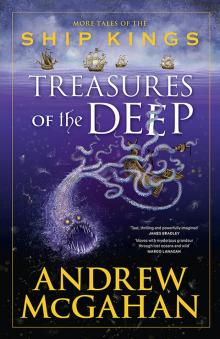 Treasures of the Deep
Treasures of the Deep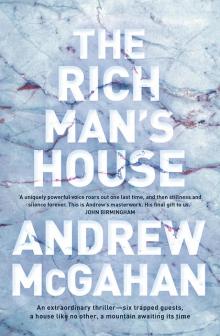 The Rich Man’s House
The Rich Man’s House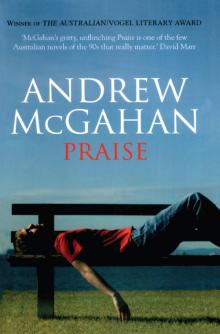 Praise
Praise The White Earth
The White Earth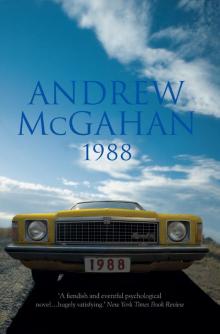 1988
1988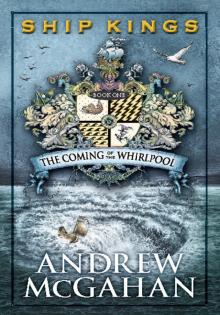 The Coming of the Whirlpool
The Coming of the Whirlpool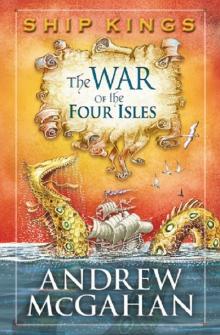 The War of the Four Isles
The War of the Four Isles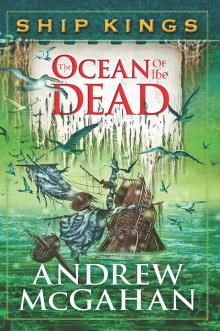 The Ocean of the Dead: Ship Kings 4
The Ocean of the Dead: Ship Kings 4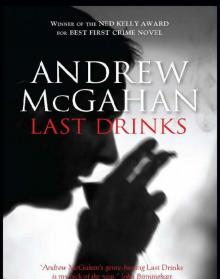 Last Drinks
Last Drinks Wonders of a Godless World
Wonders of a Godless World Underground
Underground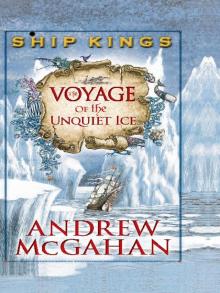 The Voyage of the Unquiet Ice
The Voyage of the Unquiet Ice